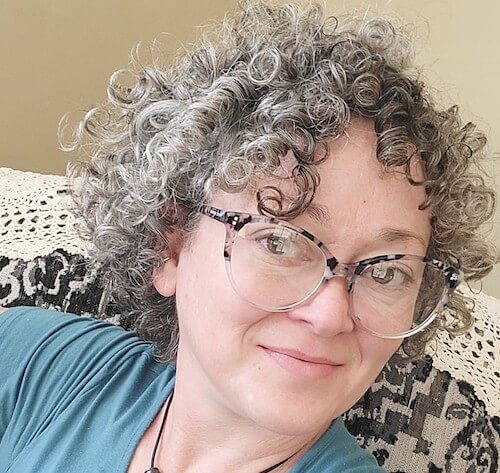Scalp scabs are quite common. They are a combination of platelets and fibrin that clot over an open wound on the scalp and harden, much like what happens when you scrape your knee or get a cut. But scabs on the scalp could also indicate an underlying medical condition that needs treatment.
VEGAMOUR dug into the research and spoke with an expert about what could be causing your scabs — plus, find out how to create and maintain a healthy scalp environment.
What Causes Scabs or Sores on Your Scalp?
Most causes of scabs on the scalp are easily remedied with improved scalp health. If the scalp scabs are something new, ongoing or especially bothersome, see your doctor or dermatologist for an official diagnosis.
VEGAMOUR spoke with Marie Burke, hair and skin expert of O'Flynn Medical, who shared with us her thoughts on common scalp scabbing causes, including scalp psoriasis, seborrheic dermatitis and contact dermatitis.
"Figuring out what is causing your scabbing issues is the key to solving the problem," said Burke. "Sometimes topical steroids or antihistamines may be prescribed in order to stop the scabs from developing."
Below are scalp disorders and conditions which are characterized by scaly areas or scabs. Other conditions cause irritation and itching which, if scratched, could lead to sores and abrasions on the scalp, which develp into scabs.
Shop: The Best Products for a Healthy Scalp
Seborrheic Dermatitis
Seborrheic dermatitis is an inflammatory condition of the outer layers of skin and can occur on the scalp. It is caused by an overgrowth of a type of yeast called Malassezia. This condition creates red, itchy skin and scales that shed. Seborrheic dermatitis can be hereditary, caused by hormonal changes or can become aggravated by cold weather conditions. Seborrheic dermatitis is the same condition that causes "cradle cap" on an infant's scalp.
Although scabs are not a direct symptom of seborrheic dermatitis, scabs could develop on the scalp if you scratch the scalp intensely and break the skin.
Contact Dermatitis
A type of dermatitis, with similar symptoms as seborrheic dermatitis, which presents following an allergic response to an ingredient or pollutant to which the scalp is exposed. It can result in bumps or blisters that ooze and form a crust.
Burke said that dermatitis, mainly contact dermatitis, is a form of allergic reaction. "These scabs are usually quite dry, red and itchy," she said. "It is usually caused by an allergic reaction to a shampoo, conditioner or other hair product."
Scalp Psoriasis
Scalp psoriasis is a condition that creates a dry, itchy and somewhat scaly rash on the scalp and also sometimes on the hairline, neck area or behind the ears. "Psoriasis can be defined by white-looking scabs that are extremely itchy," said Burke. Scalp psoriasis can be diagnosed by a dermatologist, and treatments might include light therapy or oral medications.
Also: Can Scalp Psoriasis Lead to Hair Loss? We Asked a Dermatologist
Atopic Dermatitis
Atopic dermatitis is often referred to as eczema. It's a common scalp disease that results in chronic flare-ups of inflammation, scalp "oozing" and very itchy sores or scabs on the scalp. This condition is also recognizable by flare-ups followed by periods of remission.
Head Lice
Head lice or scabies are two different insects that can wreak havoc on your scalp and hair follicles. Head lice is usually treated with a medicated shampoo, careful home cleaning and combing of the nits (eggs) and bugs from the hair. Scabies presents quite differently because you cannot see the burrowing bugs with the naked eye. Scabies mites cause your scalp to become very itchy, especially at night and require medical attention for treatment.
Again, scabs are not a direct symptom of head lice or scabies but they could develop if you scratch the skin and it breaks open.
Read: Why Is My Head Itchy? 7 Possible Reasons
Scalp Ringworm
Scalp ringworm is a fungal infection that creates red raised rings on the skin and itchy, scaly patches on the scalp. It can result in hair loss. You might mistake the itchy, scaly patches for scabs.
Dandruff
Dandruff conditions can lead to an itchy scalp and flaky skin — and even scabbing on the scalp if not properly treated. Dandruff is considered a mild form of seborrheic dermatitis.
Related: How to Get Rid of Dandruff Once and for All
Shingles Rash
Shingles causes a painful, itchy rash. This condition, caused by the chickenpox virus, can also create blisters, sores and scabs on the scalp. Sharp pain is common, and medical care is necessary for this condition.
What to Do to Address Scalp Challenges
First, assess the symptoms.
How does the scalp feel – itchy, irritated or painful? Is the skin red or inflamed? Are there other symptoms, such as scabs or sores? Are there any bug bites? Is there a raised texture on the scalp or hair loss?
#include-related-slider#
Be ready to discuss your symptoms with a medical professional, if need be.
Don't Pick at Your Scalp
Refrain from scratching or picking at the scalp. This can cause problems for your scalp, such as infection, and make your condition exponentially worse. Picking could also lead to bald patches or hair loss on the scalp.
See Your Dermatologist
You dermatologist can look at your scalp and tell you what's really going on and possibly prescribe something if your situation necessitates it.
Note that for inflamed skin, your doctor may actually prefer you do nothing but shampoo and condition regularly and use a prescribed ointment. Your primary care doctor may also want you to use a prescription shampoo or prescription medicine to treat the scabs on your scalp. Scalp infection might also require antibiotics. Other conditions may require medicated topical treatments or topical ointments to relieve inflammation and clear up thick scabs and sores or flaky patches.
Detox Your Scalp
Step up your scalp care. Consider incorporating a scalp detoxifying serum into your hair care routine to help soothe your scalp and encourage and healthy and balanced scalp biome. Apply the serum once a week before shampooing and use a scalp massager to help exfoliate the scalp.
Shampoo
If it's time for a shampoo, then you may simply be experiencing a buildup of product or sebum oils. Wash your hair and rinse out the shampoo very well before you do your conditioning treatment. Consider using a hydrating shampoo and conditioner duo that gently cleanses your scalp and hair.
Depending on your current shampooing schedule, you might need to shampoo your scalp and hair more frequently.
Eliminate Irritants
Avoid ingredients that you suspect are irritating your scalp. Contact dermatitis occurs when there's an allergic response on the scalp when the scalp comes in contact with an offending agent. This could be an ingredient in your regular shampoo or it could be something in the mousse you use on your hair.
Some frequent offenders include:
- Artificial fragrances
- Phthalates
- Sulfates
- Parabens
See: Natural Haircare Products You Need
A Word About Homeopathic Options
You might be tempted to use home remedies, such as applying tea tree oil or apple cider vinegar on the scabbed areas. However, before you try random home remedies, it's wise to ask your doctor if they are appropriate for your particular skin condition.
Could Scalp Scabs Mean Skin Cancer?
Actinic keratoses are pre-cancerous patches or bumps on the scalp that are rough, dry and can result in crusty or scaly skin, like sandpaper. They are a result of sun damage to the scalp (most often seen in older men with hair loss) and can develop into squamous cell carcinoma if not treated. Genetic factors might also factor into whether people develop these pre-cancerous patches or bumps.
If you have places on your scalp that fit the description of actinic keratoses, try not to panic but rather consult with a medical professional, such as a dermatologist, who knows how to treat scabs of this nature. If your doctor is concerned about cancer, he or she will closely examine the scabbed areas and might even perform a skin biopsy to make a diagnosis.
Also: What Does a Healthy Scalp Look Like?
The Takeaway
Scabs on the scalp are not normal and they always need to be addressed. The presence of scabs might be resolved by simply treating your scalp gently and using the right hair products to balance your scalp biome. However, scabby areas could also indicate a condition that needs to be diagnosed and treated by a doctor, such as a scalp disorder or a bacterial infection. Whatever the case, a healthy scalp is necessary for healthy hair, so make sure you take care of the problem promptly.
More From VEGAMOUR
- Can Infections Cause Hair Loss?
- Do You Know Your Scalp Type?
- Scalp Psoriasis vs. Dandruff — What's the Difference?
- Experiencing Sore Scalp and Hair Loss? Here's What You Should Know




















